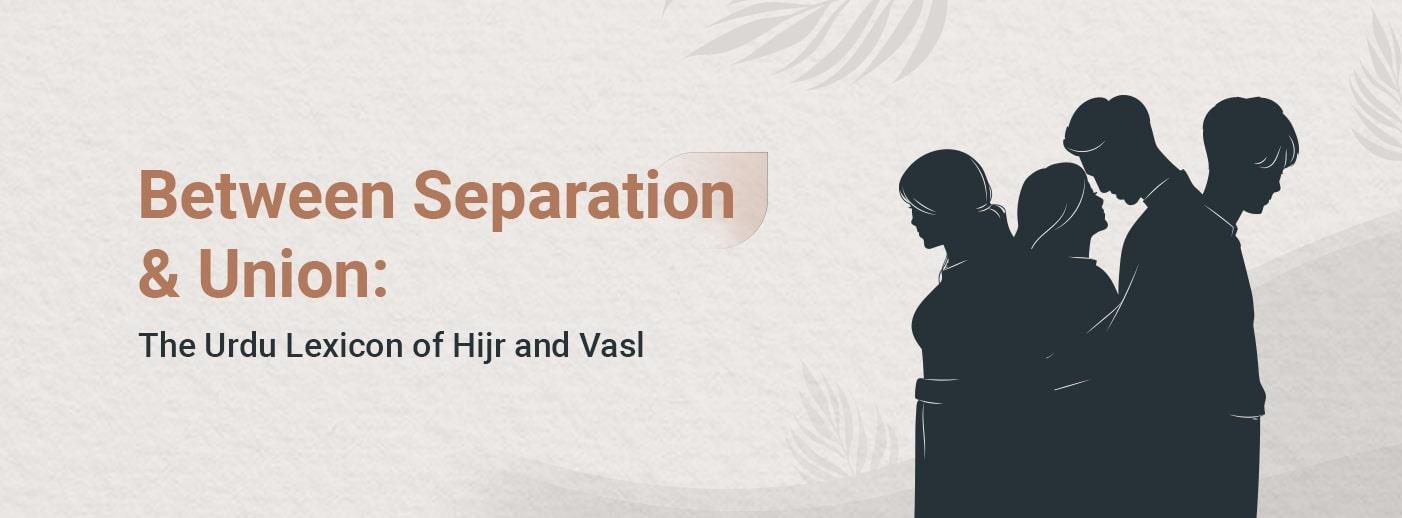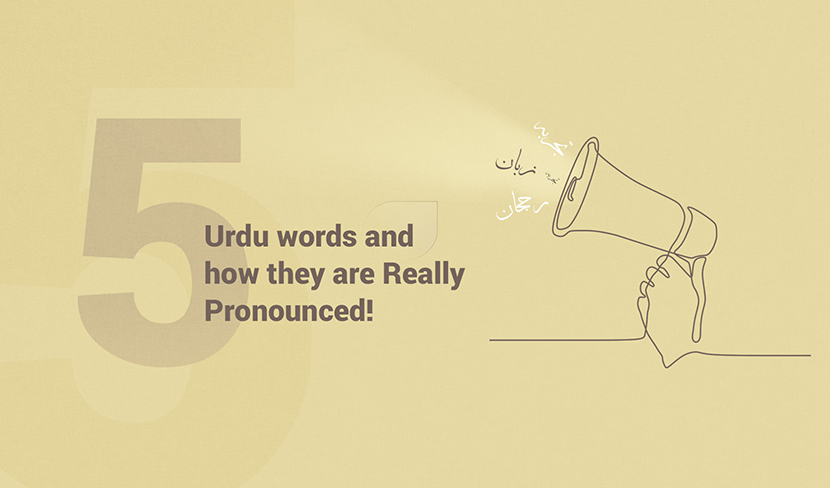Top searched
Saved words
khisyaanii billii khambaa noche
an embarrassed or ashamed person tends to vent his/her feeling by quarrelling
be-niyaaz
without want, free from want, wanting nothing, not in need, able to dispense, independent, carefree
Between Separation and Union: The Urdu Lexicon of Hijr and Vasl

In the realm of Urdu poetry, words are not mere symbols that denote one meaning or another. In the world of this poetic marvel, even the smallest word like ‘ah’ becomes a tapestry full of meaning and sentiment. And, within this realm, we have words, intricately woven into the enchanting verses and poems of Urdu. These words are ever classic, used by poets of all times alike; words which are concepts in their own capacities; words that are entire poetries in themselves.
And today dearest reader, we are going to dive into two words that have, for ages, been the beloved companions of Urdu poets. We are going to explore the longings of ‘Hijr’ and the excitements of ‘Vasl’ in all their profound glory as penned down by the greatest of Urdu poets.
Hijr:
In Urdu poetry, where words carry the weight of emotions, 'hijr' emerges as a star player. This word has its roots in Arabic, stemming from the h-j-r root, and quite literally, it signifies separation, particularly from a beloved or partner.
However, in Urdu poetry, 'Hijr' is not merely a word. It transforms into a concept, an emotion, a season of the heart, and a journey of the soul. It speaks of longing, solitude, and distance, all encapsulated in the delicate lattice of verse.Take a look at the following couplets, and analyse how the term ‘hijr’ has been used distinctively in each case:
bahut dinoñ meñ mohabbat ko ye huā ma.alūm
jo tere hijr meñ guzrī vo raat raat huī
In this poignant verse of Firaq Gorakhpuri, 'hijr' embodies the duration of separation from a beloved. He beautifully describes how a night spent in the solitude of longing stretches into an eternity, emphasising the profound impact of yearning.
Jaun Elia, known for his immediacy of expression, employs 'Hijr' to describe the act of parting from a beloved. He seeks permission to embark on a new affair, acknowledging the separation:
tumhārā hijr manā luuñ agar ijāzat ho
maiñ dil kisī se lagā luuñ agar ijāzat ho
But 'hijr' is not the end of the road in the realm of separation. The h-j-r root gives birth to a family of words, each reflecting different facets of estrangement.
'Mahjuur' speaks of lovers who are left behind, abandoned, and forlorn. 'Muhaajir' refers to a person who leaves one's homeland and loved ones behind, a term with deep religious connotations, specifically referring to the the group of people who accompanied or followed Prophet Muhammad in his Hijrat.
'Hijrat,' another linguistic sibling, signifies the act of leaving one's country and family, an integral part of Islamic history, symbolising the migration of the Holy Prophet from Mecca to Medina.
But dear readers, this is not all that hijr has to offer. Urdu poetry is adorned with compound words featuring 'hijr' to express separation, longing, and the pain it entails.
One of the most talked about nights in Urdu poetry, is the night when two beloveds separate from one another, called the ‘shab-e-hijr’ or the night of separation. In his couplet, Manzar Lakhnavai reminisces the night of separation by the memory of the times spent together:
shab-e-hijr yuu.n dil ko bahlaa rahe hai.n
ki din bhar kii biitii ko dohraa rahe hai.n
Gulam Yahya Huzur Azimabadi captures how how painful the shab-e-hijr actually is. In this couplet, he talks about how a lover would die on the night of separation from their beloved:
shab-e-hijr me.n ek din dekhnaa
agar zindagii hai to mar jaa.e.nge
hijr-zada, which means affected by separation, is beautifully used in this couplet penned by Zakia Ghazal:
maiñ tere hijr-zada mausamoñ kī zad meñ huuñ
pas-e-ḳhayāl tirī qurbatoñ kī had meñ huuñ
Other compound words like ‘gham-e-hijr’ (the pain of separation), ‘hijr-e-yaar’ (separation from a beloved), ‘sadma-e-hijr’ (trauma of separation) and ‘mausam-e-hijr’ (the season of separation) are also often used in Urdu literature.
Vasl:
The other end of this tale is the union of the lovers and companions, otherwise known as ‘vasl’ in Urdu. It's a word that holds immense admiration and carries various shades of meaning, much like its counterpart 'hijr'. But what sets vasl apart is its inherently positive nature in a lover's life. Although, clever poets have managed to sprinkle a hint of sadness into vasl as well.
The term ‘vasl’ is Arabic, stemming from the v-s-l root and literally means meeting, connection, union, joining. It has been extensively used in Urdu poetry, as the ‘vasl’ is a much awaited instance. Ameer Minai’s couplet perfectly captures the anticipation of vasl:
vasl kaa din aur itnaa muKHtasar
din gine jaate the is din ke liye
Now, let's explore a recurring theme in the world of 'vasl' poetry - the melancholy that comes hand in hand with 'hijr'. The pain inflicted by separation taints even the moments of union.
Look at these couplets for example:
thii vasl me.n bhii fikr-e-judaa.ii tamaam shab
vo aa.e to bhii nii.nd na aa.ii tamaam shab
Here, Momin Khan Momin captures the restlessness of a heart that, even in the embrace of love, remains haunted by the fear of parting.
And let's not forget Jaun Elia's bold declaration, that desires, though intoxicating, often make the waiting period more bearable than the fleeting moments of vasl:
jaan-levaa thii.n KHvaahishe.n varna
vasl se intizaar achchhaa thaa
Vasl doesn't restrict itself to tales of love alone. It finds its place even in the realm of revolutionary Urdu poetry. Faiz Ahmad Faiz sheds light on the harsh reality that life isn't solely about reuniting with a beloved; there are other sufferings to endure:
aur bhii dukh hai.n zamaane me.n mohabbat ke sivaa
raahate.n aur bhii hai.n vasl kii raahat ke sivaa
Now, let's lighten the mood a bit! Daag Dehlvi, the witty poet, playfully mocks the moazzin for his impeccable timing, calling for prayer just when he was about to reunite with his beloved:
dii mu.azzin ne shab-e-vasl azaa.n pichhle pahr
haa.e kambaKHt ko kis vaqt KHudaa yaad aayaa
From the v-s-l root, words like visaal (synonym of vasl), mausil (the place where two things are joined), tavassul (union) and visaali (related to union) and others are also formed.
See how many dimensions 'hijr' and 'vasl' have in the realm of Urdu poetry? The journey from separation to reunion is explored in all its agonies and triumphs. And with that, we conclude our tales of hijr and vasl for today. Stay connected, kyunki aise blogs se vasl zyada door nahi hai!
Delete 44 saved words?
Do you really want to delete these records? This process cannot be undone





